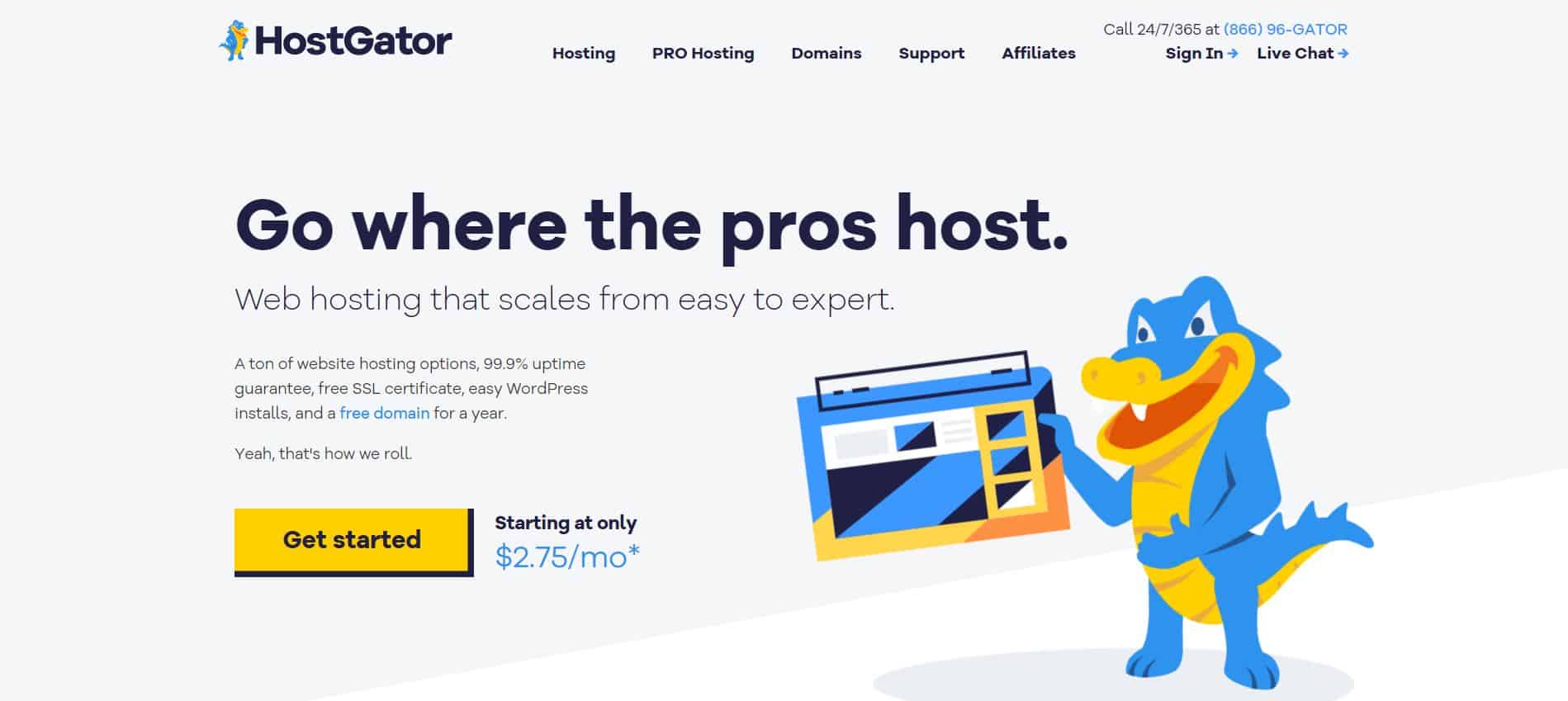If you want a reliable VPS in Australia, look for these key attributes:
- High uptime
- Sufficient disk space allocation
- Effective service levels (both tech support and customer support)
- A reasonable cost
- Extra optional extras to customize your hosting plan
Broadly speaking, this is the lens through which we examine VPS hosting providers in 2021.
Top 6 Choices for Australian VPS hosting
Virtual private servers (VPS) are far superior to the entry-level option of using shared hosting plans. A VPS uses one server that’s turned into a series of virtualized servers. The benefit of this is that each virtual server has an independent operating system, server configuration, features, and more. This usually includes being able to restart the virtual server or make application installations without needing tech support to step in. Dedicated resources per VPS include one or more CPU core(s), accessible RAM, allocated memory for PHP processes, and more.
A VPS plan is a great solution at an affordable cost compared to renting a dedicated server to obtain a similar level of control at a far higher monthly cost. Because the hardware is managed – often in the cloud – it’s also a hands-off solution too.
Upgrading to a Cloud VPS includes almost instant deployment of ‘spun up’ new servers, quick installation of new applications such as Magento or WordPress, at a low initial cost. Typically, costs are based on technology usage and access time, so the server can scale with your needs while staying affordable. Upgrades can be added like more cores or extra RAM when required, due to the scalable cloud infrastructure.
For enterprise-grade technology with a cloud deployment, Kamatera is a standout. They offer cloud hosting at affordable rates with servers that start at the basics and scale up to incredibly powerful ones. They can accommodate complex setups to allow for the demands of major corporations with expansive websites receiving impressive levels of traffic. They are our #1 pick for Australian VPS hosting.
Kamatera is just one brand from this global provider of IT services that originated in 1995. They’ve now accumulated over two decades of experience operating data centers and managing servers around the globe. Their client list spans many thousands by offering cloud-based technologies all day, every day.
A VLAN interface delivers security, privacy-focused accessibility for users in the cloud over a private network. The load balancing technology along with effortless scalability maintains high performance, reliable results, and above all, speed.
There’s a useful calculator on the Kamatera site to figure out the cost for different server configurations. Select the desired operating system (Debian, Ubuntu, CloudLinux, or Windows Server are available). Also, decide how much fast SSD space is required to a maximum of 1TB. The cloud server can also be customized for public IP addresses, allocated RAM, CPU cores available, and a bandwidth allowance of up to 500GB at the top end.
Trying the service out is possible without needing to over-commit yourself. Flexibility is built into the system. Pricing is charged per minute and products are cancelable when they’re no longer required, so costs are manageable too.
The service list is extensive including managed cloud services, a migration offering, consulting for the cloud, infrastructure for SaaS clients and mobile apps, and many eCommerce options too. There’s a 99.95% uptime guarantee and at least some plans come with a free traffic allowance too.
Pricing: 30-day free trial that begins at $4.00/month.
Pros
Cons
InMotion has VPS hosting as their priority, but they’re not restricted to a limited set of options nor are their customers. In addition to virtual private servers, they also offer both dedicated and shared server options. Furthermore, they also support customers with web design services should that be required. For people who want everything under one roof, and the ability to grow with the company, it’s hard to argue with their offering here.
Their associates receive over 160 hours of training before being front-facing, so the customer service and support staff know their stuff. Each associate also has a minimum of four years in this environment to learn their trade before coming on-board too.
The VPS hosting from InMotion includes managed services with a management plan and security updates. This allows you to focus on your core business and not worry about the servers running behind it. For self-hosting, they provide peace of mind.
Pros
Cons
#3 Best Australian VPS Host – Bluehost
While Bluehost is renowned for their shared hosting – their marketing has made them the first stop for many hosting customers – they also offer other hosting packages. These include cloud-based ones, VPS, and dedicated servers. And domain names if required.
They’ve been out in Utah for the last 15 years and now manage over two million sites. They employ over 700 members of staff who oversee their technology and the support needs of their customers.
Managing multiple servers is possible with their flexible VPS setup. Scaling up the disk space as needed avoids storage issues on the account, plus adding a range of VPS servers to meet different requirements is doable too. Also dedicated hosting and/or shared plans are also in their list of available services. One standout feature with Bluehost is that they only use solid-state drives to speed up disk access for better speed and reliability.
Once your account is set up, creating a VPS is almost instantaneous. They use KM Hypervisor to provide easy access for every VPS customer. Access to cPanel is unusual and useful. It also permits customers to increase their storage level on-the-fly. Increasing the RAM or CPU for a VPS plan isn’t directly possible right now but may be in the future.
Pros
Cons
#4 Best VPS Host in Australia– HostGator
HostGator originated in Florida – the land of the Gators – hence the name. Despite being bought out, the name and approach haven’t changed much since 2002. They now are responsible for hosting an incredible number of websites compared to smaller hosts. Their services include dedicated servers, VPS hosting, and shared hosting. Additionally, they’re capable of providing search engine optimization, managing PPC advertising campaigns, and producing website designs for clients too.
There is a live chat option, and 24/7 customer service is provided. But it’s seldom needed because customers have full control over their VPS. They’re also able to customize and change the configuration to meet their personal needs.
It’s possible to scale with HostGator because they have a broad range of hosting options and added services. Whilst their VPS hosting is lesser-known, they are still one of the top ones.
Pros
Cons
#5 Best VPS Host – iPage
iPage is a long-standing web host that’s been around since the late 90s. They offer various types of hosting plans, email servers, website design, and more.
Their focus is on providing low-cost hosting options coupled with dependability. Their systems are easier to use than most, so they have a following with busy SMEs who require services without the fuss. iPage provides VPS hosting, plus dedicated servers, WordPress hosting, and shared hosting. All services include their customer support around the clock.
Root access for their VPS isn’t automatic but can be requested. There are also other customization options too. The VPS hosting includes proprietary software or apps from the client. Get in touch with them to discuss that. Their VPS is cloud-based and one of the more flexible ones.
Also, migration isn’t difficult because the VPS is set up almost immediately. The ability to scale up as a website becomes busier and to scale down later is also possible if you anticipate having peak seasons.
Liquid Web has been offering hosting services for two decades. They’re pricier than many of their competitors but aim to offer more to back that up.
Besides VPS servers, they have dedicated hosting plans, and support WooCommerce and WordPress hosting too. As fully managed servers, it’s hands-off for their customers. They handle server issues, general admin, hardware upgrades, and network management include installing software patches and updates to keep safe.
The VPS plans include ones with a different allocation of RAM and SSD storage. The management level possible depends on the plan and the location of the data center. While the VPS won’t support a custom operating system, they do provide a choice of five popular ones.
Upgrades are a button click away. Their customer support is excellent and has a strong reputation that you get what you pay for.
For anyone on shared hosting, they will get a surprise when moving up to virtual private servers. The speed that page’s load is significantly faster than they’re used to. VPS plans also typically have far greater customization potential to scale up and down as needed. They can be modified in other ways too. Also, VPS hosting can support different requirements including some fairly complicated ones.
Virtual Private Server hosts are a step-up from shared hosts for many site owners who want to take their hosting more seriously. They offer increased flexibility, without endless maintenance problems, and there are plenty of quality options to choose from.
Furthermore, there are other hosting plans if you feel that VPS hosting is not for you.
If you're still unsure, read our guide to the best Australian we hosting where we outline the top hosts for you and explain why.
FAQs for the Best VPS hosting providers
For complete beginners with their first site, then VPS hosting is overkill. However, for established sites and customers who want greater control over their hosting, then they’re the next step beyond shared hosting plans. While they’re a little more expensive than shared hosting, they offer far more in speed, resources, and support.
A VPS has a greater allocation of processor cores and RAM. It’s also not weighed down as much by other sites being hosted on a crowded server. Due to the virtualized nature of the hosting, it is somewhat isolated and performs reasonably independently for speed and reliability purposes. When you've outgrown the often-sluggish performance of shared hosting, then a VPS is the answer to your hosting problems.
The best VPS provider changes over time. Currently, we feel that Kamatera is the best overall. InMotion Hosting is also a strong contender too. It depends on where your priorities lie as to which VPS host will be the best for you. They each offer pros and cons, less or more customization, and come in at different price points. It’s best to consider your options carefully before deciding.






